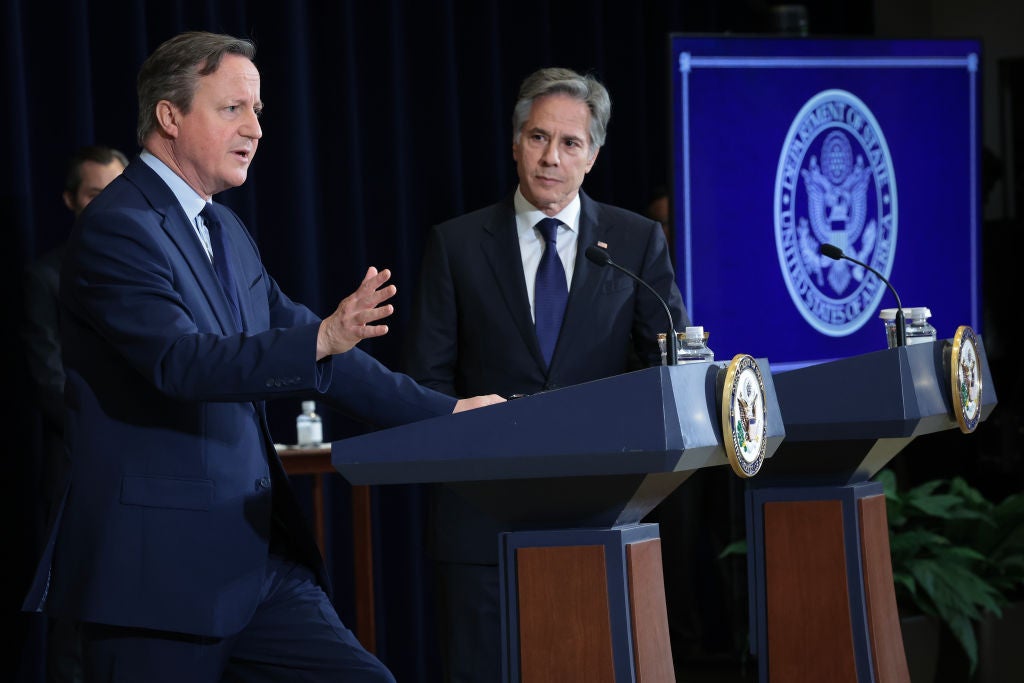Trump remains tight-lipped on everything this week — from David Cameron’s visit to abortion
Trump’s presence was felt in DC this week, even as he stayed stewing in his Mar-a-Lago estate

Donald Trump may be hundreds of miles away from Washington, sequestered his Mar-a-Lago estate, but his presence was felt keenly on Tuesday as the most senior diplomats from the US and UK gathered to address the war in Ukraine.
Just hours earlier in Florida, David Cameron had met with Trump over dinner. But in DC, he was tight-lipped about the details of that meeting and the topics discussed. Indeed, Cameron was forced to insist upon the historical precedence for his visit to Mar-a-Lago as Antony Blinken, the US Secretary of State, fended off questions about whether the meeting was disruptive to the Biden administration’s own foreign policy initiatives.
Back in his adopted home state, it is presumed that Trump continued to stew over his 88 remaining felony charges and the civil fraud trial verdict he is appealing in New York. He offered no comment other than the description of the meeting his press secretary supplied to reporters. That summary was vague to say the least, offering little more than a list of discussion topics: Ukraine, Nato, Brexit and even the death of Queen Elizabeth.
Cameron and Trump are thought to be on opposite sides of the isolationist-interventionist spectrum and in disagreement in particular over the role of Nato in the contemporary defence of Europe. Trump made headlines earlier this year with a bold proclamation at a rally in South Carolina that he would “encourage [Russia] to do whatever the hell they want” to Nato countries who do not meet the 2 per cent GDP benchmark for defence spending set by the Nato charter. Needless to say, that is a benchmark many do not meet.
The former president’s comments caused consternation for government officials across Europe and raised more questions about the future of the mutual defence treaty in a possible future Trump administration. Meanwhile, his allies in Congress — such as Ohio’s JD Vance — continue to rail against the idea of welcoming Ukraine into Nato.
In Congress, Ukraine aid remains frozen in the House of Representatives. Part of a supplemental funding bill which includes funds for Israel’s military, the aid package for Kyiv passed the Senate in mid-February but has languished ever since. Speaker Mike Johnson has prevented it from reaching the House floor for a vote.
The lower chamber recessed for much of March, further delaying the aid Ukraine and the White House say is critical in the face of renewed Russian offensives. Johnson has said that the chamber will take up the bill “right after” it returns from recess this week; lawmakers gaveled in the chamber on Tuesday.
Johnson’s own path forward on the Ukraine aid package is beset by the haunting spectre of Marjorie Taylor Greene, the far-right Georgia congresswoman whose opposition has been clear for months. That opposition has now materialised in the form of a motion to vacate the speakership. She has threatened to bring the motion to the floor with privilege should Johnson allow the legislation to pass, and Republicans now have the thinnest majority in the lower chamber that either party has seen in years. Some Democrats have hinted, however, that they could cross party lines to save Johnson’s speakership if he bucks the far right. Speaker Johnson is not set to meet Mr Cameron this week while the foreign secretary is in Washington, with reporting indicating that he couldn’t fit the diplomat into his schedule.
Across the country, another political storm is brewing in Arizona.
The state’s highest court handed a devastating blow to reproductive rights supporters on Tuesday and ruled that one of the nation’s strictest abortion bans can take effect. The law, passed in 1901, bans terminations outright except to save the life of the pregnant woman. That decision follows a similar ruling from Florida’s state supreme court just last week, and comes as both states are poised to put a vote to codify abortion rights on the ballot this autumn.
Democrats were in virtual lockstep on Tuesday denouncing the latest ruling in Arizona. All members of the party who reacted publicly pledged the party’s support for writing the overturned protections of Roe vs Wade into federal law if Biden wins the presidential election.
Meanwhile, Republicans sank deeper into the disarray that has overcome their party on the issue of abortion rights since 2022, when the Dobbs decision first dropped.
Nothing made that dynamic more evident than a statement from Kari Lake, the firebrand Trump supporter and former TV journalist who is seeking a Senate seat in November. Having previously called Arizona’s ban a “great law on the books” in an interview that took place shortly before Roe was overturned, Lake backed away from it entirely on Tuesday. In a statement that wedged her firmly to the left of Donald Trump, her most important ally, Lake wrote in a statement that it was “abundantly clear” the ban was “out of step” with Arizonans. She vowed that she would oppose any abortion ban pursued at the national level — the issue, she said, should be left up to the states.
Trump released his own pre-recorded message laying out his stance on abortion just a day before the Arizona ruling dropped. The former president, who spoke at the anti-abortion March for Life while president and who continues to take credit for “killing” Roe vs Wade, claimed in his remarks that he had made both sides happy by ending federal protections for the medical practice.
Trump remains murky on the issue of when he believes abortion should be legally prohibited. His rhetoric around the issue largely amounts to inaccurate portrayals of Democrats, whom he claims want to allow the “murder” of babies after birth. How he will fare when pitted against real Democrats and their real views on the campaign trail remains unclear.